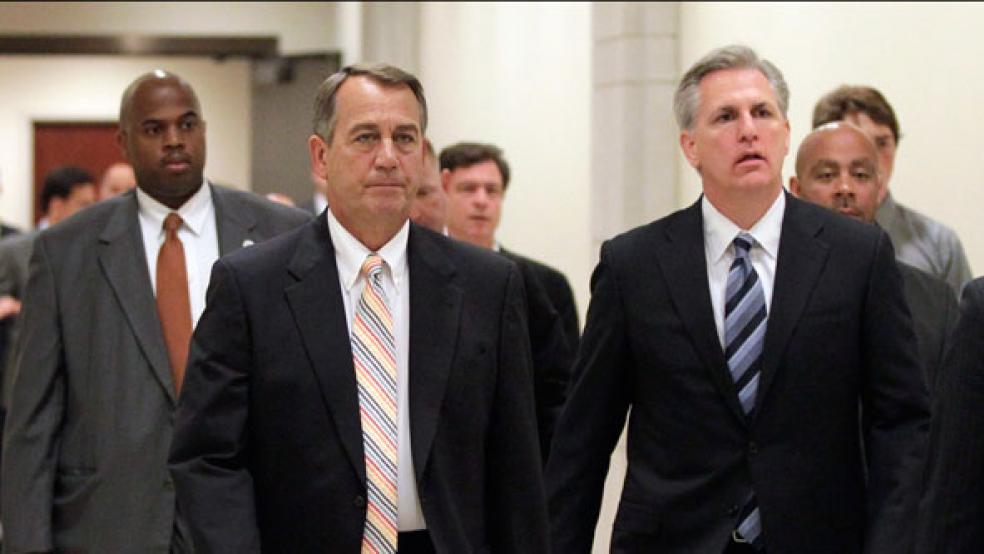Republican House leaders on Thursday signaled the first real thaw in their frigid relations with President Obama – one that potentially could avert a first-ever default on the U.S. debt next week and at least temporarily end the week-and-a-half long government shutdown.
In a news conference following a closed-door meeting of House Republicans, Speaker John Boehner (R-OH) announced a new plan to raise the debt ceiling for six weeks in return for an iron-clad agreement by Obama and Senate Majority Leader Harry Reid (D-NV) to negotiate on a range of unspecified issues. While the offer doesn’t directly address the government shutdown, Boehner said that it would be discussed when an 18-member delegation of House Republicans meets with the president late this afternoon.
“What we want to do is offer the president today the ability to move a temporary increase in the debt ceiling and agreement to go to conference on the budget” in return for his willingness “to sit down and discuss with us a way forward to reopen the government and to start to deal with America’s pressing problems,” Boehner said. The Speaker described the offer as a “good-faith effort on our part to move halfway” to what Obama has demanded in order to have these conversations begin.
RELATED: 3 WAYS TO END THE GOVERNMENT SHUTDOWN
House Majority Leader Eric Cantor (R-VA), said that “the American people expect both sides to sit down and work out their differences when you’re operating in divided government.”
“There is very little time left,” Cantor noted, with Treasury Secretary Jack Lew’s warning that the Treasury could begin defaulting on its debt as early as next Thursday unless Congress and the White House strike a deal. “We cannot waste any more time.”
Obama "is happy that cooler heads at least seem to be prevailing in the House" over the need to avoid a possible default if Congress fails to raise the debt limit soon, White House spokesman Jay Carney said when asked about a GOP proposal for a short-term increase in the federal borrowing limit.
The freshly unveiled GOP plan would suspend the debt limit until Nov. 22, the Friday before Thanksgiving, while also forbidding Lew from using “extraordinary measures” that his department has used in recent years to extend his borrowing authority for weeks after the ceiling is reached, according to the Washington Post. This creates a hard “X date,” as financial analysts call the issue, leaving no wiggle room beyond that day.
RELATED: BOEHNER'S CREDIBILITY DIMINISHES AS CRISIS MOUNTS
The plan for a six-week increase in the debt limit, without any conservative strings attached, was aimed in part at calming jittery financial markets, according to senior GOP advisers. Until now, Boehner has hewed to the demands of Tea Party activists in the House and Senate to try to force the president into making concessions on Obamacare, entitlements, government spending levels, taxes and other matters before ending the shutdown or defusing the looming debt crisis.
But Obama and Reid have repeatedly rejected earlier GOP demands or proposals, including the opportunity to reopen portions of the government that have received considerable media attention.
At the same time, Republican party leaders, activists and donors have concluded the strategy of linking Obamacare to government spending in the new fiscal year has failed. And they reportedly are pressuring Boehner, Cantor and other House GOP leaders to devise an exit strategy from the impasse before the crisis tanks the markets and throws the economy back into a tailspin.
Polls show that most Americans disagree with efforts to defund or dismantle the president’s signature health care law, and are far more critical of the Republicans’ role in triggering the crisis than that of the president’s.
The fate of the latest GOP gambit is anyone’s guess. MSNBC reported that Boehner’s plan received a cool reception from many House Republicans this morning, and there’s no way of knowing whether the leadership could pass the measure with a majority of Republican. Moreover, Obama has been insistent that he would not begin talks until Congress votes to end the shutdown and lift the debt ceiling, without GOP conditions tacked on.





